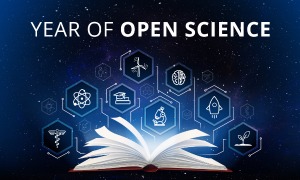
August 2023 Newsletter

August 2023 Newsletter

Galter Library
The federal government defines open science as “the principle and practice of making research products and processes available to all, while respecting diverse cultures, maintaining security and privacy, and fostering collaborations, reproducibility, and equity.” UNESCO has been an incredible champion for openness, reinforcing open science pillars of knowledge (e.g., publications, software, data, educational resources), infrastructures, engagement, and exchange with other knowledge systems. The White House Office of Science and Technology Policy (OSTP) issued guidance in August 2022 on Ensuring Free, Immediate, and Equitable Access to Federally Funded Research, asking agencies to accelerate access to data and publications. The OSTP declared 2023 as the Year of Open Science to advance national open science policies across the federal government. This strategic priority area has been reinforced by actions across the federal government to advance national open science policy, provide access to publicly-supported research, accelerate discovery and innovation, and achieve equitable outcomes.
The NIH has long been a leader in openness through the NIH Public Access Policy, established in 2009, and most recently through the NIH Policy for Data Management and Sharing (DMS Policy), which became effective earlier this year to promote the management and sharing of scientific data generated from NIH-funded research. The DMS Policy establishes requirements of Data Management and Sharing Plans, emphasizes the importance of good data management practices, and communicates the expectation for prioritizing the appropriate sharing of data. NIH has developed several resources to support consistent processes and compliance, while minimizing researcher burden including Elements of an NIH Data Management and Sharing Plan, Allowable Costs for Data Management and Sharing, and Desirable Characteristics of Repositories for Managing and Sharing Data Resulting From Federally Funded Research. The NIH Scientific Data Sharing website is also a great resource. We’ve worked to support this area of need at Galter with resources, training, and services to support the Feinberg community. Highlights include the Prism Repository, classes on data management, and Galter Guides on the NIH Public Access Policy and NIH Data Management Plans.
Several benefits of open science have been identified, including:
Open science holds the potential to drive advancements that benefit individuals and communities alike. As open science continues to bridge the gap between researchers, clinicians, and the public, its role in shaping a healthier and more informed society becomes increasingly significant. We are excited about supporting open science at Galter! Please contact us any time for support, training or resource needs, or with questions.
Learn more about open science